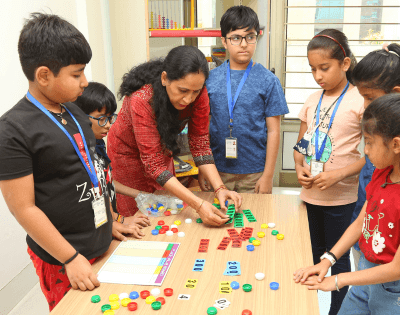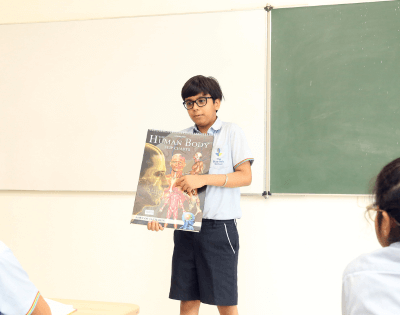
As a child, what did you do in your free time?
For many of us, it would be dirtying our hands in mud or playing a sport of our choice. Evenings were all about playing outside and our parents struggled to get us back home.
Times have changed and the advent of technology growth has introduced kids to digital games.
Today, we see kids hooked to either iPads, mobile screens, or game stations, swiping their fingers or vigorously working the joystick to beat an opponent or score the next goal – but all this over a virtual screen.
Across the world, kids in the age group of 8 to 18 years spend a whopping 7.5 hours of their day in front of a screen. That’s almost 1/3rd of their day!
This has adverse effects on their mind as well as body. Therefore, it is important that children are encouraged to engage in physical activities.
Here are a few suggestions of age-old games that can reignite your child’s love for playing outdoors.
1. Hopscotch
This is perhaps one of the easiest games to play. Your child can enjoy a game of Hopscotch with a couple of friends or even by themselves
The Indian name for Hopscotch is “Stapoo”. Rings a bell, doesn’t it?
So pull out your chalk and draw the Hopscotch board in your backyard. Find a stone and give it to your child to use as a marker. You can also check out different variations of the board to break the monotony.
Let your little ones engage their motor skills and enjoy this fun, easy-to-play game.
2. Red Light, Green Light
An interesting game, ‘Red Light, Green Light’ is sure to keep your child engaged in gameplay for hours. It starts with one child (leader) facing away from where the other children are.
When the leader’s has their back turned away from the group, it’s ‘green light’. Children can now move towards the leader. The moment the leader turns around, it’s ‘red light’ and everyone must stop. If caught moving, you need to go back to the starting line.
Since the game requires skills to perfect the pace at which they can instantly stop should the leader turn around, it can be used to teach children patience.
3. What’s The Time, Mr Wolf?
Similar to ‘Red Light, Green Light’, the game requires three or more players. It begins when one child is chosen to play Mr./Ms. Wolf. They stand a good distance away from the other children with their back towards them.
All the children standing in a side-by-side queue announce, “What’s the time, Mr/Ms Wolf?” The wolf responds with a time between 1 and 12 (only whole numbers).
The children take as many steps as the time. For instance, 5 o’clock would mean taking five steps forward.
This is repeated till the players are only a few feet away from the wolf. Once they are too close, the wolf’s response to their question is, “Dinner Time!” Taking this as a cue, children run back to the starting line.
The one who gets caught by the wolf becomes the next Mr./Ms. Wolf.
4. Monkey in the Middle
Quite like dodge-ball, the game involves one child standing inside a hand-drawn circle. The other players surround the child in the centre and pass the ball back and forth, making sure that it is out of reach from the “monkey in the middle”.
Once the monkey catches the ball, the player who threw it becomes the next monkey in the circle.
5. Please, Mr Crocodile
Please, Mr Crocodile can be played indoors (in an empty room) as well as outdoors.
Players stand side by side at one side of the play area, and Mr Crocodile stands in the middle.
The players need to cross the river without getting caught by the crocodile. So, they ask him, “Please Mr Crocodile, may we cross the river? If not, what’s your favourite colour?”
Players wearing clothes or accessories of the crocodile’s favourite colour get to cross the river untouched. Once they reach the other side, the ones left must run across the river without being caught by Mr Crocodile.
The player who gets caught becomes the next Mr./Ms. Crocodile, restarting the game.
Playtime is as Important as Study Time
Every child needs a break from studies to release their pent up energy. Apart from giving children some space to have fun with their friends, playing outside also comes with a number of benefits:
- Builds imagination and creativity
- Enhances motor skills
- Fosters cognitive growth
- Promotes physical fitness
In keeping with this, The Blue Bells School for Integrated Learning places equal importance on learning, sports and extracurricular activities. The campus has safe, well-equipped spaces designed for optimal physical development and inculcation of team spirit.
So, the next time your child asks you for permission to go out and get their hands dirty, let them!




